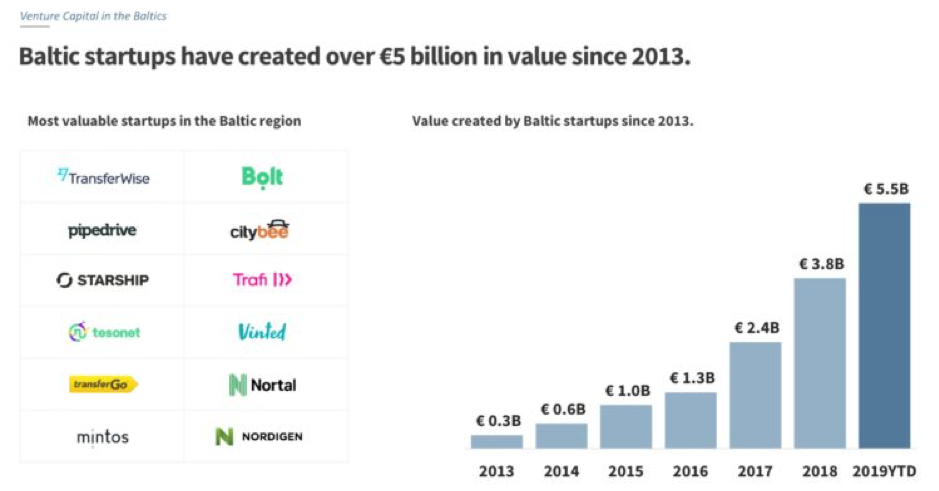A recent return visit to the Baltics and one of their great innovation events brought a specific perception front of mind to me once more – the fact that the Baltics embrace and deliver a young, vibrant innovation ecosystem that creates new entrepreneurs and start-ups almost daily. The Baltic states have a combined population of just over 6m people yet their importance in terms of European and global innovation cannot be underestimated.

Despite their small size, the three Baltic countries are showing impressive results in digitalisation and being a booming space for start-ups. Continuously ranked among places with best tax regimes, ease of doing business, and tech savviness, the Baltic states are quite an interesting phenomenon in the European start-up scene. Estonia alone is home to some of Europe’s fastest growing companies – including four unicorns. In the meantime, the neighbouring countries of Latvia and Lithuania are also catching up.
So why are the Baltics so successful when it comes to creating start-up innovation? There are number of factors that contribute to this phenomenon.
1. History
Since the Bronze Age the Baltics have established extensive global trade relations, including the period of industrialisation when Riga had become a port of worldwide significance. Following nearly two centuries in which the Baltics fluctuated between the desire to retain independence and multiple occupations mass movements for change emerged in each of the Baltic republics in 1988.
Having achieved independence in the early 90’s the subsequent decade saw the development of new constitutions, new currencies, and new foreign markets for each of the Baltic states and at the beginning of the 21st century, the Baltic states experienced sustained economic growth and closer integration with the nations of the EU and NATO two groups that all three countries joined in 2004.
2. Culture
The historic backdrop showcases the desire for independence and entrepreneurship, which appears to be deeply ingrained in Baltic culture. Throughout the Baltics, hard economic times have ultimately made the population better businesspeople. Young, ambitious and confident in their own abilities, they have created their own opportunities proving that the start-up culture isn’t solely reserved for the heavyweights of San Francisco, London and Berlin.
3. Entrepreneurial activity
According to a World Economic Forum report, Northern Europe and the Baltics are a hotbed of entrepreneurial activity with Estonia, the birthplace of Skype, is being recognized as the most entrepreneurial country in Europe. The report, Europe’s Hidden Entrepreneurs: Entrepreneurial Employee Activity and Competitiveness in Europe, looked at a form of entrepreneurship beyond the typical start-up – intrapreneurship – with some interesting conclusions. Intrapreneurship involves workers formulating and implementing new ideas within organisations, rather than starting their own businesses. Indeed, Estonia has become a place for developing, testing and bringing to market innovative digital solutions with the information and communication technology (ICT) sector now constituting some 20% of total exports.
4. Politics
So how did Estonia and the Baltics realise success and what did their governments do to foster entrepreneurship? For starters politicians in Estonia have continuously held supportive views of innovation and technology that have led Estonia to develop state of the art e-governance systems for already over 20 years leading to a state-of-the art e-society. Thus, Estonia was the first country to provide state as a service to people around the world with e-residency. Estonia’s leaders at the highest levels recognise the potential of ICTs and the start-up scene and are supportive to the community’s aspirations as well as back its activities.”
Additionally, Estonia launched the Estonian Entrepreneurship Growth Strategy 2014–2020 focusing on three areas: increasing productivity, stimulating entrepreneurship and encouraging innovation.
The government has also developed a dedicated website, Startupestonia.ee, to support start-ups and simplify the registration process for new businesses.
5. Other factor
- Tech hubs – In Crunchbase’s 2019 report on the top 100 global accelerators 17 were listed in Europe of which 2 were in the Baltics. In terms of population size compared to the rest of Europe, the Baltics should have 1 in a 100 European accelerators, not 2 in 17.
- Funding – there is a vibrant network of Baltic angel funds, VC and corporate investment and as the Baltic states are leading reformers, with strong recent economic growth they are
judged to be relatively efficient and easily accessible for foreign investors. - Events – The Baltics are booming with festivals, events, conferences, and forums where people from start-ups, tech, and businesses can meet and make great ideas happen.
- Women in tech – On the European map, the Baltic states stand out with rather high representation of women in tech.
In Summary
The Baltics are benefitting from a rare combination of global entrepreneurial ambition, a favourable political system, modern tech infrastructures that were built from scratch in the last 20 years and young people growing up looking to solve big problems. As an up and coming tech innovation ecosystem for entrepreneurs with big ideas, the Baltics have plans for the future and an eye on the global marketplace.
We are keen to hear your views on these points, as well as your experience of Baltic innovation. Please post your thoughts and tag ‘Whitecap Consulting’ (LinkedIn) or @Whitecapconsult (Twitter) or send Stefan an email at [email protected].
Hopefully you’ve found this article useful. If you feel that your strategy development and strategy implementation process would benefit from independent review and challenge, please get in touch.
Established in 2012, Whitecap Consulting is a regional strategy consultancy headquartered in Leeds, with offices in Manchester, Milton Keynes, Bristol and Newcastle. We typically work with boards, executives and investors of predominantly mid-sized organisations with a turnover of c£10m-£300m, helping clients analyse, develop and implement growth strategies. Also, we work with clients across a range of sectors including Financial Services, Technology, FinTech, Outsourcing, Consumer and Retail, Property, Healthcare, Higher Education, manufacturing and Professional Services, including Corporate Finance and PE.